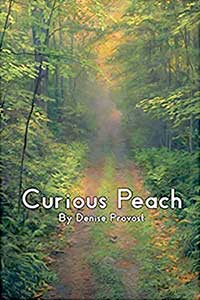 *
*
Review by Robert Cable
These poems reward our senses of sight, hearing, smell and taste! The poet observes that “ordinary seeing makes us blind.” She herself, however, has cultivated particularly keen perceptions, which she shares in these colorful, musical, fragrant, tasty poems. A winner in the Maria C. Faust Sonnet Contest, Provost’s poems tend to be of 14 lines, more or less. They are short and sweet, as is the poet herself. (Last night I had a front row seat at her public reading.) A few longer poems also tell interesting stories.

Curious Peach
by Denise Provost
Ibbetson Street Press
Are you curious about the title of this book? The phrase comes from a 17th century poem by Andrew Marvell, when “curious” meant “interesting because of novelty or rarity” rather than “eager to acquire information or knowledge,” as it does today. Curious Peach is also the title of Provost’s concluding verse, where it refers to consciousness of the fruit, which the poet imagines.
Denise Provost grew up in Maine, studied in Vermont – where Marvell was her favorite poet at Bennington College – and now lives in Massachusetts. She is intimately familiar with rural nature and with urban gardens. In addition to being a poet, she is an attorney, housewife, mother of three, and for the past two decades she has also served as a city alderman and then as a state legislator.
This chapbook provides a virtual poetic calendar or “declension of the year,” naming or describing a month, a season, a solstice or an equinox in most of the poems: “fledgling time of year,” “the tender season,” “that shadow, Autumn” “September’s sharpening cold,” “the Harvest’s gaudy show,” “winter’s monochrome.” It also describes times of the day: “pre-dawn greyness,” “sunrise pinks,” “fresh-peeled day,” “lovely day, so warm at its height,” “colors grown dull/ when the sun slipped and fell,” “deepening dark,” “evening shroud,” “dazzling day, then swift, seamless dark.”
Provost’s poems are filled with specific flowers, fruits, trees and animals: bearded iris, bees, Bradford pear, cardinal, cat, chickadee, chicory, cicadas, cornstalks, daffodils, finches, forsythia, grapes, juncos, leopard frogs, lichens, lilacs, lindens, maples, “mere grass,” milkweed, mockingbird, moss, mountain ash, mulberry trees, peach tree, peonies, pumpkin vine, Quaker Ladies, quince, rabbits, raspberries, red-winged blackbirds, robins, runner beans, skunk cabbages, sparrows, spring peepers, strawberries, sumac, tulips, water chestnuts, “noxious weeds,” wild aster, wild rose, willows. Whew! The poet is steeped in nature; and we can share it through her words.
In two poems, the poet voices apprehension about the unnaturally changing natural world of our time. Unseasonable mentions “a world whose thermostat has gone awry.” Lament from a Wingless Thing (the poet herself) voices the classical theme of Ubi sunt?: “Where are the birds/ of years gone by?/ To which rich banquet/ did they fly?” If we want to continue enjoying the wonderful nature described in these poems, we should seriously consider the question.
The cost of this delightful volume of 28 poems is $0.36 per verse, but its value is immeasurably higher. You will like it.
On page 28 there is a single typo: “juncos” not “junkos” (ten cents discount.)















Reader Comments